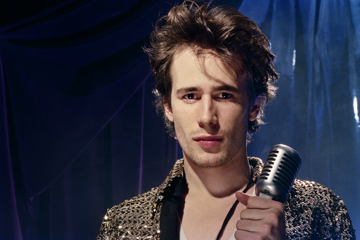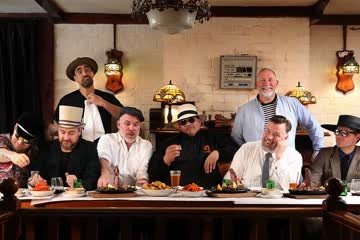The Political Filmmakers Bursting Through The Media Bubble At Sydney Film Festival
This year's SFF program celebrates uncompromising truth in the age of "alternative facts."
The waves of despair can come thick and fast when watching the nightly news or pouring over the morning paper. Pierced by persistent dog whistles from populist politicians going for the low blow for maximum effect, compassion and understanding seem in short supply and the real human cost sidelined as the ever-decreasing news cycle chews up and spits out the most complex stories in favour of the latest social media scandal. Numbness follows.
It's against this white noise that the documentary form not only excels but also reveals the humanity beyond the headlines, giving a voice and a face to the people fighting to retain their dignity, their liberty, and even their lives against unimaginable odds. Opening with the fraught ground of Warwick Thornton's Southern Cross-examining We Don't Need A Map, this year's Sydney Film Festival (SFF) line-up is packed with powerful examinations of the issues that trouble our contemporary times most. From the fate of our dying oceans in Karina Holden's Blue to the new frontier of cyber security and the disruption of game-changing leaks in Laura Poitras' incendiary profile of WikiLeaks founder Julian Assange, Risk, this year's SFF program celebrates uncompromising truth in the age of "alternative facts".
Hope amidst the ruins of Aleppo
From Brexit to Trump to One Nation, the plight of refugees fleeing war and persecution has become a convenient political bogeyman. But just how easy is it to demonise when witnessing the daily trials of those who, clinging to what little is left of home, choose to stay behind?
Don't miss a beat with our FREE daily newsletter
Unflinching in its look at the reality of survival, director Feras Fayyad's Last Men In Aleppo, one of SFF's most-startling docos, follows the fate of four "White Helmets" — the name given the men who have chosen to stay in the war-torn Syrian city to pull survivors from the rubble of shelled buildings. The impossibly brave volunteers run towards disaster amidst Syrian President Bashar al-Assad and his Russian supporters' devastating aerial bombardment, putting their lives at risk every day to help their fellow citizens.
"For me this story is about human values, about a fatherhood, brotherhood and friendship"
Speaking via Skype from Berlin, Fayyad, who has himself been imprisoned and tortured by Assad's regime and now lives in Turkey, says it was his duty to show the world what the White Helmets face. "They have to tell their story and we need to document these crimes against humanity, because the victims, they don't have this voice."
Stark as the fate of the predominantly Muslim population living in this chaos is, with one rescuer crying out to know when support will arrive from neighbouring Arab nations, Fayyad was at pains to show the vague shreds of normality that remain. There are stolen moments of funfairs and footy matches during tenuous ceasefires. White Helmet Khaled dotes on his kids but wrestles with sending them away while Mahmoud, even as he continually puts himself in danger, frets constantly about his younger brother and fellow rescuer Ahmad. "For me, this story is about human values, about a fatherhood, brotherhood and friendship," Fayyad insists. "This is the main drama, the inner conflict between responsibility to their family and their moral responsibility as a citizen."
It took four months to win the trust of the men he and his crew follow into danger, with all of them disheartened by the inaction of the international community. Fayyad hopes that at the very least Last Men In Aleppo may encourage more countries to open their arms to refugees who have fled but have still found no sanctuary. As for the White Helmets? "Everything pushes them to leave, but in the middle of all that, they ask each other, 'where are we going to go?'"
Limbo on Manus
As a politically active and passionate supporter of Kurdish rights in Iran, journalist Behrouz Boochani was subjected to constant threats and sectarian violence, narrowly avoiding a swoop that saw many of his colleagues imprisoned.
"It's the Australian people's right to know what their government is doing in their name in this prison"
Fearing for his life, he fled in 2013, but the navy intercepted the boat he boarded in Indonesia, bound for Australia. Boochani has now spent four years detained on Manus Island, where he has reported on tragedies including the murder of Reza Barrati.
Captured on his smartphone and worked on in unison with Netherlands-based Iranian-Dutch filmmaker Arash Kamali Sarvestani, the at times despairing though also strangely meditative Chauka Please Tell Us The Time — named after a local bird with a distinctive call and symbolic meaning for Manussians — reveals a grim reality close to home.
"It's the Australian people's right to know what their government is doing in their name in this prison," Boochani tells me from the Manus detention centre via WhatsApp. "Cinema has the power to change, and I don't mean that this movie will change policy, but it might change people's views about refugees."
As with Fayyad, Boochani wanted to focus on the human story. "The people in this prison are the same as you. Some of them are fathers and they have wives. They can understand love, they listen to music and they're worried about their families. The problem is that people in western countries are looking at refugees who are victims of terror as the same as terrorist groups like ISIS."
For many of the refugees on Manus, the promise of a deal with the United States was a beacon of hope dashed by the election of President Donald Trump. Languishing in limbo once more, Boochani says Trump has emboldened the right in Australia and given license to the government, "to destroy us."
With Chauka attracting attention to their plight from media outlets all over the world, Boochani hopes they will be harder to ignore. "I only have three options — kill myself and finish this life, accept living in PNG where I won't have any future or stay here and resist, to achieve freedom in a safe place one day."
Living Heritage
Tyson Mowarin has had it up to here with distant politicians and their broken promises passing judgement over Aboriginal rock art. His rousing documentary Connection To Country, commissioned by NITV and debuting at SFF, takes in the sweeping majesty of Western Australia's Burrup Peninsula and details successive waves of industrialisation, pushed by mining companies, that are scarring the sacred land.
"I wanted to show Australia what heritage means," Mowarin says. "Governments think that heritage and Aboriginal culture is a thing of the past, but you know what, it's very much alive today."
"Government's think that heritage and Aboriginal culture is a thing of the past"
One thought-provoking moment notes that churches that have stood for 100 years are often asserted more cultural value than rock art that has stood for millennia. "These sites are older than any world monuments like the pyramids or the Great Wall of China, but it's pretty easy to get permission to destroy them," Mowarin states.
Connection To Country details the struggle to protect them and some ingenious ways to share their beauty with the world, including artists digitising rock art and turning it into immersive virtual reality experiences. Mowarin hopes the SFF platform will reinforce the messages that Aboriginal culture is here to stay. "We're a sovereign people but the government has taken ownership of our sites and destroyed them. Our heritage isn't something that government has given to us, it's been here way before any government came to Australia."
The Sydney Film Festival runs 7 — 18 June at venues across the city.







